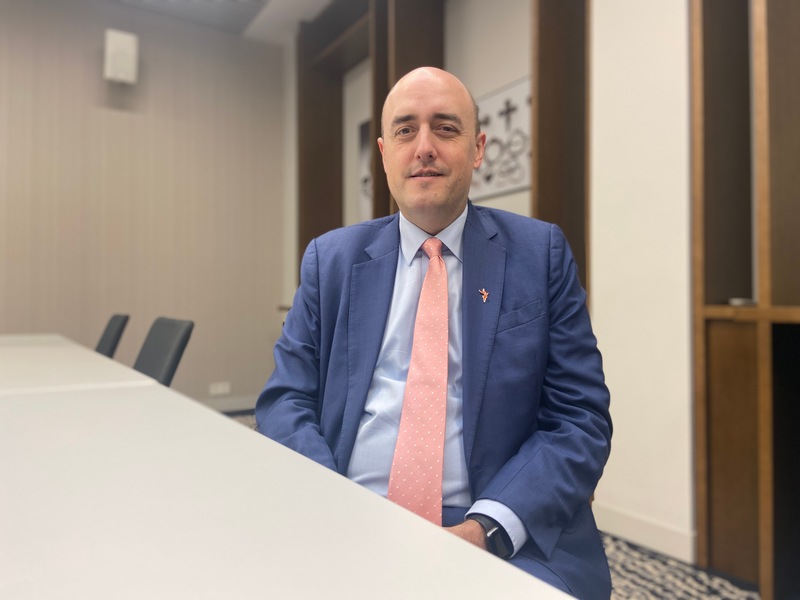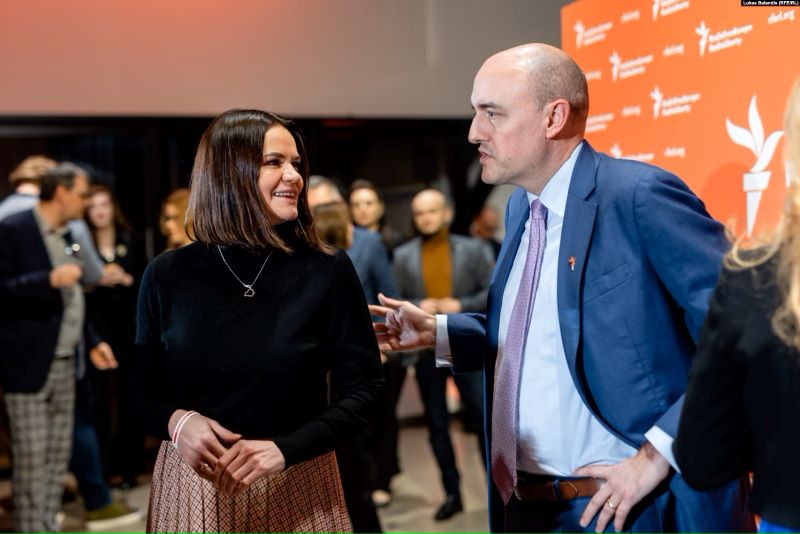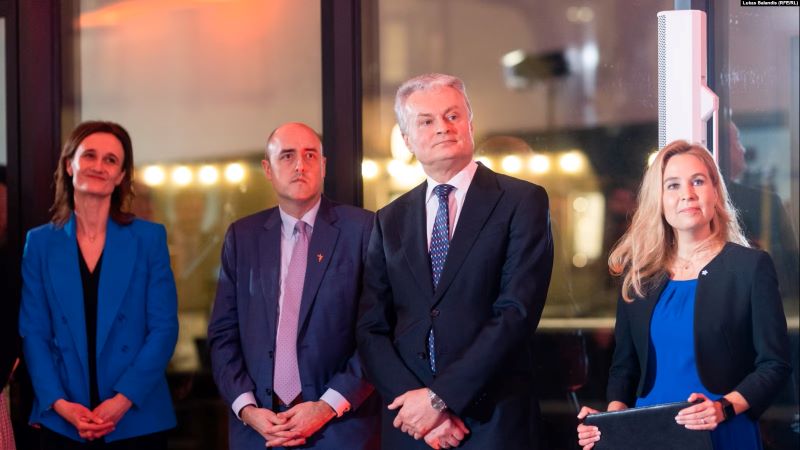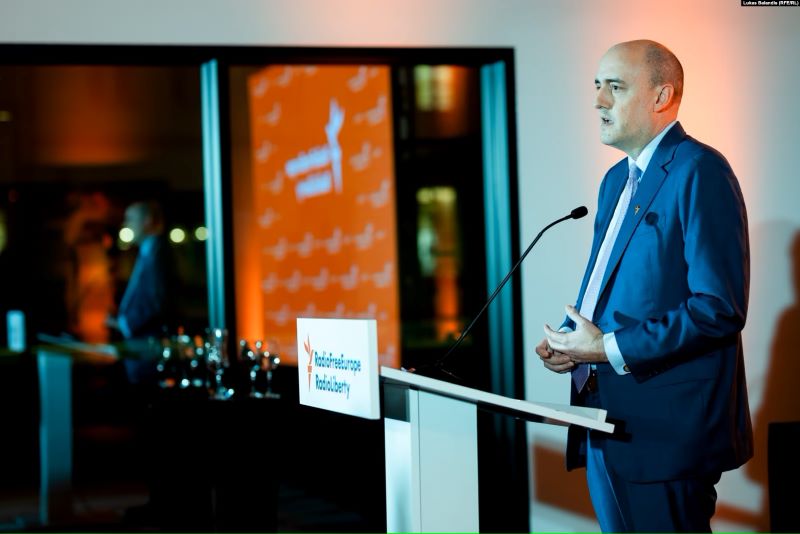Jamie Fly, Radio Liberty president: “We’ll go back to Minsk to reopen our office. It’s just a matter of time”
The new office of Radio Free Europe/Radio Liberty that opened a few days ago in Vilnius will focus on covering developments in Belarus. Jamie Fly, president of the radio station, told BAJ about his team’s mission and why attempts to regulate information are doomed to failure.

“The freedom struggle front evolved in the Baltic states”
— In the days of the Iron Curtain, Radio Liberty broadcast to the Soviet Union. Many listened to the radio in secret and are still nostalgic about those times. What is your mission now?
— In some ways, our current work is reminiscent of that time. We strive to truthfully and objectively report on what is happening in the countries we broadcast in.
Until recently, the main difference was that we were not some voice from afar, as was the case during the Cold War, when we were broadcasting from Munich, Germany, but worked directly with our audience and had representation offices.
Our Minsk office was open until 2021, and the office in Moscow had been operating for 31 years.
Now we find ourselves in a new phase: we have local journalistic competence and understand the audience’s needs, but are forced out of the country. Obviously, this is a challenge for both journalists and the audience, because their interaction and communication are now impeded.
The new office in Vilnius will focus on keeping in touch with our audience in Belarus and providing them with useful and relevant content.
— The radio station has offices in Riga and Vilnius. Why do you give importance to network development in the Baltic states? Is it a certain border dividing the world into free and non-free?
—
In many ways, the freedom struggle front evolved in the Baltic countries. Their governments support independent media and civil society. Our experience in Prague, Czech Republic, where our headquarters is located, shows the importance of building partner relations with the host government.
We also thought it made sense to be as close to our audience as possible. A strong Belarusian diaspora has formed in Vilnius, the political leader of Belarus is here, too. We consider it necessary to become part of this ecosystem.
The situation is similar for our Russian journalists in Riga. They can interact with other media and there are no difficulties in finding new employees. For these reasons, we chose Riga and Vilnius as location for new offices.
— When opening headquarters in Prague, Radio Liberty took special security measures. Do you follow this principle in Riga and Vilnius? What do you see as a threat?
— We take the safety of our journalists very seriously no matter where they are based. Our reporters have repeatedly been harassed, threatened, and expelled from their countries. Several journalists affiliated with RFE/RL are still imprisoned in Belarus.
Our correspondents have regularly been harassed by the Belarusian regime, and we are concerned about their safety even if they have already left Belarus.
We usually work closely with local authorities and carefully check the office premises. According to our standards, an office can be opened only after we make sure that it is secure. This is also the case with offices in Vilnius and Riga.
“By telling the stories of our journalists, we draw broader attention to how difficult the situation in Belarus is”
— For a long time, Belarusians had the feeling that their country was forgotten, and many even have no clear idea where it is on the map. How do you see Belarus? Is there an understanding in the West that it is a different country from Russia?
— Since the rigged elections in 2020, Belarus has received considerable attention from the international community. I think the interest remains in Washington and other Western capitals, but unfortunately, due to the events in Ukraine, the situation in Minsk is now out of focus.

At the same time, the position of our sponsors who support the work of Radio Free Europe has not changed. We continue to receive the necessary funding from the U.S. Congress and are able to work for the Belarusian audience. However, I find it alarming that the situation in Belarus looks like an extreme version of what we see in Russia.
Threats such as the criminalization of journalism and the persecution of reporters and their sources must be taken seriously. Equally alarming is the fact that in Belarus, one might end up in jail for visiting a certain site, liking a publication, or sharing content on social media.
This has reached an unprecedented level for Europe. I believe there is a danger that people like Putin will start modeling themselves on Lukashenka to maintain their power.
I think it is necessary to raise awareness of the real situation in Belarus and provide greater international support to journalists, and civic activists who are trying to change the situation for the better.
— To what extent are Western politicians and public figures aware of the situation with freedom of speech and human rights in Belarus? This topic seems to be boring and more attention is devoted to Lukashenka’s statements rather than to these issues.
— Amidst the protests, many people were focused on these topics, and I think there is still an understanding of how extreme the situation is. In turn, we do our best to attract attention through our reporting. We must not forget that two of our journalists, Ihar Losik and Andrei Kuznechyk, remain in prison.
Meanwhile, the regime targets the reporters’ families, a good example of which is the persecution of Daria Losik, whose only demand was the release of her husband. But as a result, she ended up behind bars herself and is now separated from her little daughter.
By telling the stories of our journalists, we also draw broader attention to how difficult the situation in Belarus is.
A lot of interaction with politicians — especially members of the U.S. Congress and European parliamentarians — has been dedicated to this issue.
It is a constant struggle to keep Belarus in the international spotlight and to ensure that those in the West continue to protect the interests of people who pay the ultimate price for their journalistic work.
“We reject the label, and we are not going to tolerate being prevented from doing our job”
— At the moment, many journalists and their sources and subjects are forced to remain anonymous. What are your thoughts on these challenges? How do you get information when access is impeded?
— It is not only in Belarus that we face this problem. Often we have to conceal our reporters’ identities to protect them from harassment. We take these measures if they are necessary to continue reporting and interacting with our audiences.
In today’s media space, feedback is extremely important. People want to interact with those who provide them with information. That’s why we work on ways for readers and listeners to securely deliver news to us and share photos and videos.

Obviously, this entails the need to verify the information and make sure that it is worthy of publication. In no way we want to spread rumors and conspiracy theories based on data from a single source.
The great thing about digital means of communication is that they allow for a new format of dialogue with the audience. Much of the work we do here in Vilnius will focus on just that.
— You mentioned related pressures in other regions. Can you specify in which other countries journalists face similar challenges?
— The situation is similar in Russia. It cannot be compared to Belarus, but the dynamics are similar. The radio is also present in countries such as Turkmenistan, where access and exchange of information have long been restricted.
We had a news service that worked in Iran for a long time. But recently the regime of that country declared the radio a terrorist organization, and now we cannot continue our work there. We also had to close our offices in Azerbaijan and Uzbekistan due to government pressure and persistent attempts to restrict the flow of information.
Of course, no two cases are alike. Nevertheless, it allows us to learn lessons about how to attract an audience even when governments introduce all sorts of obstacles and try to block sites, to regulate the Internet. It is impossible to fully control information in the 21st century.
— How did you feel about the fact that the Belarusian authorities declared the Internet resources of Radio Liberty extremist in 2021?
—
This is a ridiculous label. After all, we worked in Minsk for many years. And Lukashenka even gave us interviews every so often. When I last came to Belarus in 2019, the government was planning to give us more press credentials to expand the pool of journalists.
But the situation has changed dramatically in 2020 with the growth of the government’s sense of its own insecurity. The measures it takes against the independent media are part of a strategy to maintain control.
Obviously, we were not campaigning for a particular politician but were covering what was going on. Jail time for broadcasting protests from an apartment window cannot be called an act of extremism. That is a very weak imputation.

We reject this label, and we are not going to put up with being prevented from doing our job. And we continue our professional activities outside of Belarus.
— One of the highlights of the 2020 election campaign was streaming live news from the streets. This is now impossible. What will the coverage of Belarusian events emphasize now? How do you assess Radio Liberty’s impact on the Belarusian audience?
— Although we can’t do stand-uppers, there are many ways we can interact with the audience besides live streaming. For example, we make a lot of videos for social media and try to focus on covering regional news. This helps us meet the expectations and interests of the audience.
“The priority for our company is the release of journalists who have committed no crime”
— Do you follow the fate of RFE/RL workers who have been incarcerated? What is most troubling in their cases?
— Of course, we monitor and put a lot of effort into demanding their discharge and supporting their families.
The priority for our company is the release of journalists who have committed no crime. The charges against them were completely fabricated, it was revenge, and, as I mentioned above, a manifestation of fear of the Belarusian regime. I think this led to the imprisonment of many journalists who were just doing their job.
— What does the future hold for Belarus? Do you think it will ever be possible to reopen the office in Minsk?
— I know that one day we will return to Minsk and reopen the office there. I am sure of it. It’s just a matter of time.
Admittedly, I am optimistic about the future of Belarus. We saw how people stood resolutely for a free and democratic country. We saw the courage of leaders like Sviatlana Tsikhanouskaya. It was very inspiring.
The authorities’ efforts to control information look doomed. Such regimes are unstable. Eventually, they will collapse. Again, it is only a matter of time, and violent repression only hastens the collapse. Sooner or later people will demand change. It is human nature to yearn for freedom.
I do not think the regime is capable of presenting a vision of the future. This is the reason for its desperate desire to restrict the discourse. It seems to me that this will work for the time being. But I am positive that we will live to see the day when we and our audience can return to a free and democratic Belarus.
 @bajmedia
@bajmedia
